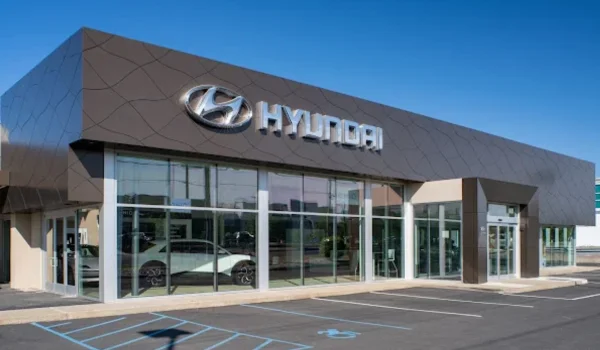Why Hyundai?
- Leading Brand with Trust: Hyundai entered India in 1996 with the iconic Santro and today ranks as the 2nd most popular passenger vehicle brand in India. Its strong reliability, quality, and affordability make it a favored choice among Indian buyers .
- Diverse Product Range: From entry-level hatchbacks like Santro and i10 to SUVs like Creta, Tucson and cutting-edge EVs like Kona and Ioniq 5, Hyundai’s portfolio caters across income segments & lifestyles .
- Robust After-Sales Support: A nationwide network of service centers, integrated financing options, and strong marketing support offer dealers a competitive edge .
Investment & Franchise Cost 💰

| Component | Estimated Range (INR) | Details |
|---|---|---|
| Infrastructure & Land | ₹5 – ₹10 Crore | Includes showroom, workshop, inventory parking space |
| Working Capital & Inventory | ₹5 – ₹10 Crore | For stocking vehicles & spare parts |
| Hyundai Dealership Fee | Confidential (embedded in Capex) | HTIL doesn’t officially disclose this; included within infrastructure |
| Total Initial Outlay | ₹10 – ₹20 Crore | Typically includes land lease/acquisition, construction, equipment, inventory |
| Service Bay Setup | ₹50 – ₹100 Lakh | Workshop bays, diagnostic tools & equipment |
- Overall Investment: Most industry reports suggest a total of ₹25–30 Crore for a full-fledged dealership including showrooms, service bays & inventory.
- Minimal Threshold: Conservative yacht-style auto setups (without land costs) start around ₹1–2 Crore. However, full-scale operations with after-sales, spares inventory and financing tie-ups require at least ₹10 Crore .
Revenue Streams & Estimated ROI
Dealerships generate revenue from:
- Vehicle Sales: Typical margins in India for new car dealers range from 2–6%, with Hyundai averaging around 4–5% .
- Spare Parts & Accessories: Higher margins here, often 12–15%.
- Service/Repairs: Profitable recurring income; combined service and parts revenue often matches or exceeds vehicle margin.
- Finance & Insurance Tie-ins: Additional commissions from insurance, extended warranties, and loan facilitation.
Estimated Payback Period:
- Typically 3–5 years for full dealership setups.
- Spare & service operations boost cash flow and improve ROI timelines.
Eligibility Criteria & Essentials
To qualify as a Hyundai dealer, an applicant must meet these key criteria:
✅ Financial & Legal Requirements
- Significant net worth and access to ₹10–20 Crore for Capex and working capital.
- Clean legal compliance, ability to execute high-value agreements.
✅ Infrastructure & Location
- Showroom: Minimum 4,000 sq ft, ground floor, high visibility location with service workshop.
- Service Bays: At least 5–6 bays with technical equipment and spares storage.
- Population Density: Area with minimum population 100,000 within a 10 km radius .
✅ Business & Automotive Experience
- Prior experience in automotive sales, retail, or similar domains. Leadership background preferred; Hyundai conducts due diligence.
- Management capability to oversee operations, HR, dealership KPIs, and customer service.
✅ Staffing & Manpower
- Trained staff in sales, finance, workshop management, service advisors, technicians, store-in-charge.
- Intention to adopt Hyundai’s training modules, customer standards, digital reporting tools.
Step-by-Step Application Process
1. Research & Feasibility
Conduct market analysis: local demand, competition, demographics.
Procure real estate meeting Hyundai’s specifications.
2. Submit Application
Access Dealer Programme from Hyundai Motor India official portal; complete detailed form capturing applicant data, financials, proposed location, business plan.
3. Due Diligence & Review
Hyundai-appointed agency will perform due diligence and review market case.
Expect communications: initial screening, document reviews, clarifications.
4. Elite Interview & Site Audit
Hyundai team visits the proposed location; interview with promoter & team.
Assessment of infrastructure, financial capacity, compliance readiness.
5. Agreement & Initial Payment
Upon approval, sign Dealer Sales & Service Agreement (DSSA).
Pay the prescribed dealer fee and performance security (details confidential).
6. Rollout of Setup
Build/modify showroom, workshop as per Hyundai’s branding guidelines.
Hyundai provides design standards, signage, IT infrastructure (CRM, inventory management).
7. Recruitment & Training
Hire staff and participate in Hyundai’s training programs at company academy.
Setup IT operations and Westpoint systems for bookings & services.
8. Inventory & Marketing Launch
Stock initial vehicle & spares inventory.
Plan launch event, activate media campaigns, local marketing blitz per brand policy.
9. Grand Opening & Operational Handover
Formal inauguration with Hyundai presence; begin operations in showroom, workshops & insurance tie-ins.
10. Ongoing Performance Management
Hyundai conducts periodic audits and evaluates KPIs like sales volume, service quality, CSI scores, P&L health. Frequent training refreshers, marketing campaigns, and performance support are provided.
Risks & Challenges
- High Capex & Working Capital: Demand large long-term investment.
- Brand Compliance: Hyundai enforces strict operational & facility standards.
- Competitive Market: Other OEM dealerships in same region; service turnaround key.
- Economic Sensitivity: Vehicle demand fluctuates with macroeconomic conditions.
- Staff Retention: Skilled technicians + sales force form backbone.
Benefits & Strategic Advantages
- Brand Recognition: Leverage Hyundai’s local & national reputation.
- Diverse Portfolio: All segments covered—Hatch, Sedan, SUV, CNG, EV.
- Recurring Revenue Ecosystem: Spare parts and services generate sustainable income.
- Support Ecosystem: Training, marketing, warranty handling, digital & financing tie-ups.
- EV & Future Scope: Entry into growing electric vehicle & green mobility segment.
Executive Summary
- Total Investment: ₹10–20 Crore (up to ₹30 Crore in metro locations)
- Payback Window: 3–5 years
Margins:
- New car sales: ~4–5%
- Spares: 12–15%
- Service & F&I: Additional profit
Eligibility Conditions:
- Net worth ₹15–20 Cr+
- 4,000 sq ft showroom + 5‑bay workshop
- Profound business experience, strong financial & operational capacity
Path to Launch:
- Market research
- Application on portal
- Diligence & site visits
- DSSA signing
- Setup + staff training
- Inventory + marketing
- Launch + operations
Final Take
Becoming a Hyundai dealer in India is a high-stakes investment with substantial upfront capital requirement. But the combination of brand strength, diverse lineup, and recurring revenue channels across vehicle sales, aftermarket, and service makes it a compelling long-term franchise opportunity.
Aspiring entrepreneurs who are financially prepared, possess leadership experience, and can build and manage a robust automotive team can unlock attractive returns over a 3–5‑year horizon, and tap into the future growth of mobility — including EVs.
✔️ Recommendations for Aspiring Dealer-Entrepreneurs
- Do Extensive Market Scouting: Spot local gaps in service or showroom presence.
- Tighten Your Business Plan: Include P&L projections, KPI targets, loan structures.
- Build a Strong Promoter Team: Hyundai prefers applicants with operational and automotive expertise.
- Plan Financing Early: Engage institutional or NBFC partners well before application.
- Prioritize Quality & Service: CSI is critical in dealer evaluation.
- Explore EV Angle: Use Hyundai’s e-mobility potential to stay ahead of competition.
📌 Next Steps
- Visit Hyundai’s Dealer Programme portal to download application form.
- Prepare documentation: net worth proof, business plan, site lease agreement.
- Network with existing dealers or dealership consultants for field insights.
- Submit application and prepare for Hyundai’s diligence & site inspections.
Conclusion
Establishing a Hyundai dealership in India is more than just a franchise – it’s a strategic partnership. It represents the convergence of capital investment, brand leverage, operational excellence, and customer service leadership. For those ready to take the leap, the rewards — both financial and reputational — can be significant in one of the world’s fastest-growing automotive markets.
Disclaimer: Figures are indicative and based on multiple sources; actual costs and timelines vary by location, state policies, and Hyundai’s internal policies. Consult Hyundai Motor India, legal advisors, and financial experts before investing.

Shashi Kant is the Founder and Editor of BusinessScroller.com, a leading platform for business insights, finance trends, and industry analysis. With a passion for journalism and expertise in business reporting, he curates well-researched content on market strategies, startups, and corporate success stories. His vision is to provide valuable information that empowers entrepreneurs and professionals. Under his leadership, BusinessScroller.com has grown into a trusted source for in-depth articles, customer care guides, and financial expertise.


